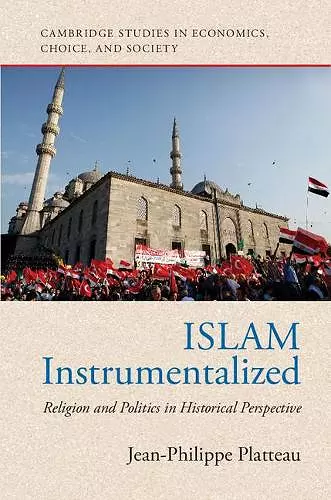Islam Instrumentalized
Religion and Politics in Historical Perspective
Format:Hardback
Publisher:Cambridge University Press
Published:6th Jun '17
Currently unavailable, and unfortunately no date known when it will be back

This book challenges the widespread view that Islam is a reactionary religion defending tradition against modernity and individual freedom.
This book challenges the widespread view that Islam is a reactionary religion that defends tradition against modernity and individual freedom. Jean-Philippe Platteau shows how Islam is vulnerable to political manipulation and how the threat of religious extremism is especially high because Islam is not organized as a centralized church.In this book, economist Jean-Philippe Platteau addresses the question: does Islam, the religion of Muslims, bear some responsibility for a lack of economic development in the countries in which it dominates? In his nuanced approach, Platteau challenges the widespread view that the doctrine of Islam is reactionary in the sense that it defends tradition against modernity and individual freedom. He also questions the view that fusion between religion and politics is characteristic of Islam and predisposes it to theocracy. He disagrees with the substantivist view that Islam is a major obstacle to modern development because of a merging of religion and the state, or a fusion between the spiritual and political domains. But he also identifies how Islam's decentralized organization, in the context of autocratic regimes, may cause political instability and make reforms costly.
'An in-depth exploration of the complex relationship between religion and politics, or actually between clerics and rulers, this book succeeds in identifying the fundamental development obstacles faced today by Muslim countries. The author does so quite remarkably by weaving together his mastery of development theory and political economy with an impressive historical erudition and a deep knowledge of politics and economics in the contemporary Muslim world. This book is a landmark for our understanding of the essential role of institutions in development, within the context of Islam.' François Bourguignon, Paris School of Economics, Former Chief Economist of the World Bank
'In this very learned book, Jean-Philippe Platteau reconsiders the long-debated role of Islam in the process of economic growth and modernization of Muslim countries. He convincingly argues against the conventional view according to which Islam is a major obstacle to development because of its association with the fusion between state powers and religious structures. This is a must-read for anyone interested in the political economy of institutions, religion and long-term development.' Thierry Verdier, Associate Chair, Paris School of Economics
'In this timely offering, Jean-Philippe Platteau addresses political Islam, one of the major forces of our time. Like an historian or an anthropologist, he resists over simplifying; but as an economist, he strives for analytic clarity. The result is an incisive and encompassing overview, one that both synthesizes and innovates. This is a major book.' Robert H. Bates, Eaton Professor of the Science of Government, Harvard University, Massachusetts
'This book is a path-breaking theory of the role of Islam in economic development and in the political economy of Muslim societies. It will re-orient the study of religion and development.' James Robinson, University of Chicago
'Islam Instrumentalized moves beyond the ideological 'clash of civilizations' discussions of the role of religion in political and economic development to provide a theoretical analysis, grounded in the principles of modern political economy, of how religious and political elites interact. More than just a fascinating discussion of Islam in the modern world, Platteau gives us a template for discussing these issues in other parts of the world, and placing them in comparative perspective. This book is the new starting point for any economist wanting to work on these questions.' Lawrence Blume, Goldwin Smith Professor of Economics, Cornell University, New York
ISBN: 9781107155442
Dimensions: 235mm x 158mm x 35mm
Weight: 870g
244 pages